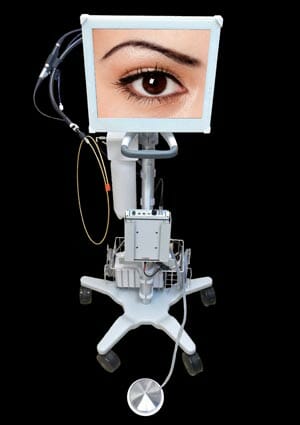The Perioscopy Alternative – Treating Gum Disease Without Surgery!
Dr. Alger has invested in a revolutionary, proven technology allowing him to treat gum disease without surgery and without the traditional process of root scaling and planing. Below is a list of frequently asked questions about this new form of minimally invasive periodontal treatment.
 1) What is the traditional approach to treating gum disease?
1) What is the traditional approach to treating gum disease?
Treatment for gum disease typically starts with deep cleaning (called scaling and root planing) to remove bacterial plaque and tartar from the tooth roots. Since the disease is underneath the gum line, it is not possible to visualize the root surfaces during cleaning. This is one reason why advanced stages of gum disease often do not resolve without gum surgery.
2) What is Perioscopy?
Perioscopy is a procedure that uses a miniature camera with advanced lighting and magnification, to visualize and treat areas below the gum line non-surgically. This miniature camera and fiber optic light source is called an endoscope. The endoscope allows Dr. Alger and his hygienist the opportunity to actually see the surface of the root below the gum line, while the tooth is being cleaned. This technology also allows the visualization and magnification of other tooth abnormalities such as decay, enamel projections or fractures that have occurred under the gum line.
3) How does the dental endoscope work?
A miniature camera is attached to a tiny probe and then gently placed below the gum line. The images are immediately displayed on a chair side video screen for the clinician and you to see. The dental endoscope provides up to 48 times magnification, disclosing minute details under the gums that before the advent of this technology, might easily be missed.
4) What are the advantages of Perioscopy?
Perioscopy allows Dr. Alger and his hygienist to accurately see and effectively treat periodontal and other dental conditions, which might otherwise go undetected. Perioscopy is a great new tool in the preservation of a patient’s teeth and in the fight against periodontal (gum) disease. Perioscopy is overall more conservative and less invasive then traditional treatment options. It is also significantly more successful than traditional scaling procedures. Dr. Alger and his hygienist evaluated over 3,000 diseased gum pockets treated in their office with traditional scaling or Perioscopy. Diseased pockets of 5 millimeters or greater where reduced to health 69% of the time with traditional scaling. In contrast, patients treated with Perioscopy had diseased gum pockets reduced to health in 90% of those cases measured. More advanced cases actually showed even better results. This is an astonishing 3- fold reduction in the number of sites with residual infection, when Perioscopy is compared to conventional non-surgical treatment!
5) Is Perioscopy right for me?
If you have gum pockets of 5 millimeters or deeper, then you may well be a candidate for Perioscopy. The goal of Perioscopy is to get a tooth root exceptionally clean so that the gums and surrounding tissues can become healthier. It is especially effective in the “esthetic zone”, which involves those teeth that you see when you smile.
6) Can surgery be avoided with Perioscopy?
Gum surgery is an effective and frequently used therapy for patients with advanced periodontal disease. If you do require surgery, Dr. Alger will provide this treatment for you as skillfully and as gently as possible. However, Perioscopy reduces or eliminates the need for surgery, in many instances. Dr. Alger will be sure to discuss your treatment options with you, to develop a plan the best suites your individual needs.
7) How long does Perioscopy take?
Because of the intricate clinical nature of Perioscopy, procedures tend to take a bit longer than a standard appointment. Depending upon the condition and location of the teeth being cared for, treatment usually takes 2 hours for half of the mouth.
8) Is Perioscopy expensive?
Perioscopy treatment is often one third to one half of the cost of gum surgery. Patients frequently report that Perioscopy was a worthwhile investment that helped them to save their teeth.
9) Does it hurt?
Generally, there is very little, if any discomfort during a Perioscopy procedure. Dr. Alger and his hygienists are committed to taking the appropriate steps to ensure your comfort.
